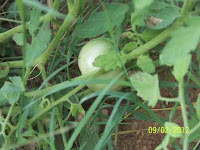Ramblings of a Wannabe Farmer
By Donald Baker
Last week at our Beginning Farmers and Ranchers class at the Kerr Center, I had the opportunity to have a discussion on successful farming with Mr. George Kuepper, Horticulture Program Manager and the main instructor for the Horticulture track.
We had just returned from visiting Wild Things Farm, a very successful farming operation located in Pocola, Oklahoma. Our discussion related to the ability of small acreage, or even backyard, farms to be successful.
Based on my limited knowledge of farming and what we learned at Baker Heritage Farms over the past 9 months, it is my humble opinion that small acreage and back yard farmers can be just as successful as large commercial farmers, and possibly even more successful. Smaller farms can adapt more quickly to changing conditions, including weather, markets, and growing habitat, then large commercial farms can.
Larger commercial farms generally specialize in two or three primary crops, concentrating on those crops that will generate the most profit that season. The size of these operations limit plantings, many times to just one planting per year.
Small farms generally plant a number of different crops, and have the ability to plant throughout the year, depending on where they are located. These farms usually specialize in market crops that are in demand in their local area.
When disaster hits, the large commercial farms are more exposed to crop loss, whether the disaster is weather related, or related to insects, fungus, or other disaster. This has been very evident over the past two years. Corn, soy beans, and wheat are generally sensitive to weather, particularly drought or flood. As such, commercial farmers have had two devastating years back-to-back. Their losses were high due to their concentration on one crop. The small acreage farmer, however, can better plan for drought through diversification, planting schedules (Baker Heritage Farm had several successful crops because planting was late, missing the heat related pollination issues that affected many larger commercial farmers), and the ability to address the disaster due to the smaller scale.
How does this relate to profit? Mr. Kuepper and I agree - the small acreage or back yard farmer can be profitable, possibly even more profitable per acre than larger commercial farmers. How can this be possible when commercial farmers have more equipment, better infrastructure, and larger acreage? If you take away the government crop insurance and other government sponsored price support programs, there is a good possibility that the larger commercial farmer will show more of a loss than a profit over time. All of the large equipment cost money, the infrastructure costs money, and the cost of buying or renting acreage has increased substantially over the past several years. The small acreage, or backyard, farmer is usually able to control operating and input costs, more through necessity then planning. By using organic (sustainable) growing methods, the smaller farmer is constantly improving the soil while producing market crops. The crops produced are of higher quality, more favorable, and healthier than those produced by larger farmers, and thus, can bring in more profit when sold locally. The integrity of the soil is maintained, avoiding draining resources from the soil allowing continuous planting without damage to the soil.
Small farm operations can better control costs and production, providing a safety net through diversification (Wild Things Farm has diversified into agri-tourism), and can generate a higher profit margin.
While the payday will not be larger, the profit margin can be, and the additional benefits (lifestyle, being good stewards of the land, time with the family, and working with your hands) are irreplaceable.
Yes, farming is a challenge - but what would life be without a challenge. Will the family farm ever return? We hope so. The objective at Baker Heritage Farms is to determine successful ways for the family farm to exist and to promote the benefits of family farming.
Keep watching for more Ramblings. Next up - challenging the claims that food causes obesity.
Until next time ...




















